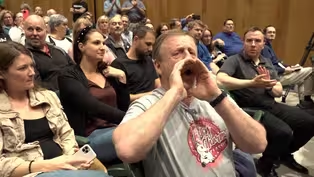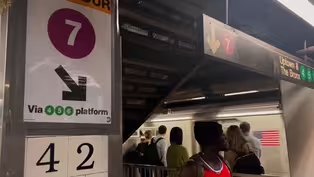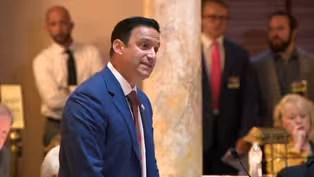NJ Spotlight News
Report: Disabled people wrongly placed in nursing homes
Clip: 10/3/2023 | 5m 32sVideo has Closed Captions
Interview: Bren Pramanik and Gwen Orlowski, Disability Rights NJ
Disability Rights New Jersey, the state’s protection and advocacy system for people with disabilities, recently released the results of an investigation into nursing homes during the COVID-19 pandemic. The report highlights that among those living in nursing homes who died from COVID-19 were a large number of people with intellectual and developmental disabilities.
Problems playing video? | Closed Captioning Feedback
Problems playing video? | Closed Captioning Feedback
NJ Spotlight News is a local public television program presented by THIRTEEN PBS
NJ Spotlight News
Report: Disabled people wrongly placed in nursing homes
Clip: 10/3/2023 | 5m 32sVideo has Closed Captions
Disability Rights New Jersey, the state’s protection and advocacy system for people with disabilities, recently released the results of an investigation into nursing homes during the COVID-19 pandemic. The report highlights that among those living in nursing homes who died from COVID-19 were a large number of people with intellectual and developmental disabilities.
Problems playing video? | Closed Captioning Feedback
How to Watch NJ Spotlight News
NJ Spotlight News is available to stream on pbs.org and the free PBS App, available on iPhone, Apple TV, Android TV, Android smartphones, Amazon Fire TV, Amazon Fire Tablet, Roku, Samsung Smart TV, and Vizio.
Providing Support for PBS.org
Learn Moreabout PBS online sponsorshipAnother investigation into New Jersey's veterans homes backs up the same scathing findings in previous reports.
The state commission of Investigation today released its analysis showing the COVID 19 pandemic exposed at times deadly flaws with management and operations at the Paramus and Menlo Park Veterans Homes.
That's where nearly 200 people died from COVID related causes.
The investigation found the homes were unprepared for massive absenteeism from frontline staff, had major communication breakdowns and no clear plan to isolate sick patients.
Now, many of those issues persist today, according to the report.
The FBI is also backing calls to remove the nursing homes from under the Department of Military and Veterans Affairs.
Meantime, disability rights, N.J., which is the state's protection and advocacy system for people with disabilities, is releasing its own investigation into nursing homes.
It found that among those who died from the coronavirus, living in one of those facilities were a large number of people with intellectual and developmental disabilities.
People, the organization argue, shouldn't have been there in the first place.
To dig into the investigation, I'm joined now by Gwen Orlowski, the executive director, and Bren Pramanik, the managing attorney for disability rights, N.J..
It's great to have you both here with me.
Gwen, let me start with you.
Why did the organization launch this investigation and what did you find?
Because in the report you wrote that these hospital like environments were dismal places for anyone to live.
So before COVID, we had a presence in nursing homes and we started to notice an increased number of people with intellectual and developmental disabilities there.
And that just isn't the right setting for those individuals in most cases.
And then at the beginning of COVID, it was clearly a crisis in nursing homes all across the state of New Jersey.
And it quickly came to our attention that people with disabilities in general, but in particular people with intellectual and developmental disabilities were just at high risk and that this needed our attention.
And so once we were able to get back into nursing homes, we were.
And that's what helped us make the decision to launch this into a systemic investigation.
What were the key findings?
Once you launched it, the.
State doesn't really know how many people with intellectual and developmental disabilities are in New Jersey's nursing homes.
So there's no official count.
No official count.
No.
And our second finding was that the federal rules that talk about people going into nursing homes with intellectual and developmental disabilities that are really meant to protect those individuals and have them have the opportunity to be in the least restrictive setting, in the most integrated setting in the community.
What's best for them exactly.
It wasn't working.
And then the third thing that we found is that the entire system just does not recognize the right of people with developmental disabilities to make their own decisions about where they live and to be supported in a very person centered way in that in those decisions and then in the services and supports that they get.
So Brand, you were involved, as I understand, with doing what site visits and in-person interviews.
What did that look like and what did people tell you?
We as part of this investigation, thought that we it was important for us to see as many of those individuals as possible and speak to them.
So we visited over 70 nursing homes.
These these nursing homes really are I think there's sometimes a misconception that maybe I think home sometimes is a misconception that we use that word.
These are institutions, these are hospital like settings.
And a lot of them really are dismal.
And I think places that I certainly walked into and thought I would never want to live here.
I wouldn't want anybody in my family to live here.
So again, we thought it was really important to speak to as many people as possible and really get a sense from them about what it was like living in these institutional settings and if they wanted to even do that.
And quickly, does it appear that these nursing homes have replaced what have typically been the homes, group settings, other better fitted facilities for folks with intellectual developmental disabilities?
I would simply say no, it's just it is not something that's happening quickly.
Glenn, for me, what do you all recommend in the last few seconds that we have?
Sure.
I mean, first and foremost, the state has to know who these people are, where they are, and they really have to know what these people want and need in their lives.
We need to recreate that federal system that I was talking about to ensure that people have the opportunity when they're at risk of nursing home placement, to have community based options and the services and supports that they need.
And all of that is really to further their constitutional right in New Jersey to make decisions about where they live and how they live those lives.
And so we want the state to really be aggressive in moving this system towards that.
Brian Pramanik and Glenn Orlowski, thank you so much for sharing this investigation with us.
Thank you.
Thank you.
16th District candidates clash on abortion, parental rights
Video has Closed Captions
Clip: 10/3/2023 | 3m 51s | Sen. Andrew Zwicker (D) and Mike Pappas (R) are in a rematch (3m 51s)
Extend NYC subway to New Jersey?
Video has Closed Captions
Clip: 10/3/2023 | 4m 44s | Reps. Pascrell and Menendez make a pitch (4m 44s)
First round of cannabis ‘equity’ grants awarded
Video has Closed Captions
Clip: 10/3/2023 | 3m 17s | Grants were awarded to 48 businesses (3m 17s)
Republicans push for probe of NJ attorney general’s office
Video has Closed Captions
Clip: 10/3/2023 | 4m 45s | Republican state senators call for independent investigation (4m 45s)
Providing Support for PBS.org
Learn Moreabout PBS online sponsorship
- News and Public Affairs

Top journalists deliver compelling original analysis of the hour's headlines.

- News and Public Affairs

FRONTLINE is investigative journalism that questions, explains and changes our world.












Support for PBS provided by:
NJ Spotlight News is a local public television program presented by THIRTEEN PBS



